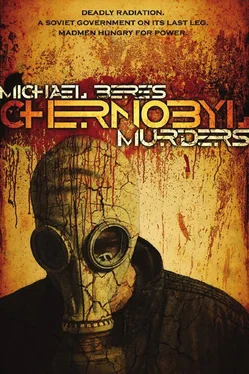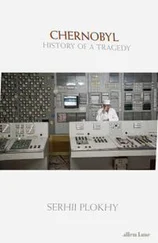Michael Beres - Chernobyl Murders
Здесь есть возможность читать онлайн «Michael Beres - Chernobyl Murders» весь текст электронной книги совершенно бесплатно (целиком полную версию без сокращений). В некоторых случаях можно слушать аудио, скачать через торрент в формате fb2 и присутствует краткое содержание. Жанр: Триллер, на английском языке. Описание произведения, (предисловие) а так же отзывы посетителей доступны на портале библиотеки ЛибКат.
- Название:Chernobyl Murders
- Автор:
- Жанр:
- Год:неизвестен
- ISBN:нет данных
- Рейтинг книги:4 / 5. Голосов: 1
-
Избранное:Добавить в избранное
- Отзывы:
-
Ваша оценка:
- 80
- 1
- 2
- 3
- 4
- 5
Chernobyl Murders: краткое содержание, описание и аннотация
Предлагаем к чтению аннотацию, описание, краткое содержание или предисловие (зависит от того, что написал сам автор книги «Chernobyl Murders»). Если вы не нашли необходимую информацию о книге — напишите в комментариях, мы постараемся отыскать её.
Chernobyl Murders — читать онлайн бесплатно полную книгу (весь текст) целиком
Ниже представлен текст книги, разбитый по страницам. Система сохранения места последней прочитанной страницы, позволяет с удобством читать онлайн бесплатно книгу «Chernobyl Murders», без необходимости каждый раз заново искать на чём Вы остановились. Поставьте закладку, и сможете в любой момент перейти на страницу, на которой закончили чтение.
Интервал:
Закладка:
Children. At the funeral, Pavel’s wife said they were going to have children. She repeated it over and over as he helped carry the coffin to the grave site set aside for Kiev’s KGB agents and militiamen. “He was only twenty-seven and no children!” screamed Pavel’s wife as the coffin was lowered.
Shortly after Pavel’s funeral, Nikolai was sent here. In the farmhouse there were three children-a baby belonging to the Sandors, who lived in the house, and the two daughters of Nina Horvath, who had come from Pripyat by way of a Moscow hospital. Walking beyond the oblong box with its oilcloth, discarded utensils, and border of untrimmed weeds, Nikolai wondered about Detective Horvath’s boyhood here with his brother, little boys playing games just as he and Pavel had done when they were boys. Today the games were more serious. The winner’s prize was to remain alive. Today’s orders were to be alert for the possibility Detective Horvath and Juli Popovics might show up. And tomorrow? Who knew?
Nikolai was not alone. He and the others took twelve-hour shifts alternating between the farmhouse and the small hotel in the village. Originally there had been four men. Now, with the arrival of Captain Brovko and three others, the total was eight. At any given time there were at least three of them at the house.
Nikolai reached the end of the yard where tilled soil began, looked at his watch, and turned back when he heard tires on the gravel road. He had been at the house for his twelve-hour shift and, walking to the side of the house, was glad to see Captain Brovko in one Volga and three replacements climbing out of a second Volga.
One of the men stretched and yawned loudly. Nikolai joined the other two who had spent the night at the house, each of them alone, alternating positions every two hours. One man in the house, one in the car, and one walking about the perimeter, all three armed with Stechkin machine pistols.
Nikolai was about to get into the second Volga with his two partners when Captain Brovko called him over and sent the other two ahead to the hotel. As the men drove away, Nikolai wondered what more could possibly happen to him.
“Come,” said Captain Brovko. “I’ll drive you back.”
The inside of the Volga was warm. For the moment, as Captain Brovko drove down the road into the dust of the other Volga, Nikolai felt safe. Here, in a warm Volga with his machine pistol stowed on the floor and his new captain driving, he was assured of not being attacked from behind by Detective Horvath returning to his boyhood home. No matter what Captain Brovko had to say, even if it was a reprimand, he was glad to be away from the house with its dark yard and the women inside who conveyed hatred by simply looking at him. Last evening when he took his turn in the house, Mariska Sandor, the resident farm wife, played a game with the little girls in which she claimed she could tell their fortunes by observing teacup stains. During the game, Mariska Sandor had turned to him and claimed she could tell how long he was going to live. The smile on her face when she said it frightened Nikolai, filling the remainder of the night with visions of Detective Horvath sending him to join Pavel in the grave.
Shortly after the road curved and dropped down the small hill, Captain Brovko pulled over to the side and parked. Ahead, and slightly below, the village greeted the sun, clay tiles on the roofs taking on the color of rouge on a woman’s cheeks. The Volga carrying his two partners disappeared into the main street of the village, leaving only the dust settling above the road.
He and Captain Brovko spoke of their pasts. Nikolai described the PK and his and Pavel’s assignment in the Pripyat post office.
Captain Brovko described working in Moscow and in the GDR.
Captain Brovko said he missed Moscow because he had a girlfriend there. Chernobyl had ruined plans to spend a furlough with her.
Nikolai mentioned his latest girlfriend in Pripyat, wondering if she had escaped. He told Captain Brovko how Pavel had come to the door the Saturday morning after the explosion and found him in bed with his girlfriend. Captain Brovko laughed with him, and this, combined with the morning sun shining through the windshield, made Nikolai feel more relaxed.
After a pause, during which they stared ahead at the awakening village, Captain Brovko asked about the assignment. “What do you think, Nikolai? Will Detective Horvath and Juli Popovics really come here?”
Nikolai knew it was time to choose his words carefully. “Because we are here, Major Komarov must have reason to believe so.”
“What do you think of him?”
“Detective Horvath?”
“No. Major Komarov.”
“I… I don’t think anything. I simply follow orders.”
Captain Brovko chuckled. “Don’t worry, Nikolai. I’m not trying to trick you. We’re in this together, assigned to a farmhouse in the middle of nowhere. Can you tell me why Detective Horvath would come here when he knows we’re waiting?”
Captain Brovko turned to stare at him. “I don’t blame you for not answering. Especially after being uprooted from your PK assignment and sent on a field mission during which your partner was killed before your eyes.”
Nikolai was silent as he stared at Brovko’s eyes.
“You and your partner were unprepared for the situation. Afterward you were angry because of the inappropriateness of the assignment. Correct?”
“Yes.”
Captain Brovko leaned closer. “Now I’ll tell you something, Nikolai. I believe Detective Horvath will come here. He’ll be drawn here because his brother’s wife and children are here. There are things about this case even I don’t know, things Major Komarov, for whatever reason, has chosen to keep to himself.”
“The major is a driven man,” said Nikolai.
“In what way?” asked Captain Brovko.
“He is willing to do anything to prove Detective Horvath is a saboteur.”
“What has he done so far?”
“I can’t say more, Captain. I’ll get myself in trouble the way Pavel got in trouble because he didn’t know the consequences of aiming a pistol at an armed militia detective.”
“Tell me,” said Captain Brovko, “why do you think, with the men available to him in Kiev, Major Komarov chose to send you and your partner to retrieve Juli Popovics?”
Nikolai looked out at the road, where an ancient battered bus began climbing slowly up the hill. “I don’t know, Captain. Pavel and I were both inexperienced. I don’t even know what I’m doing here.”
The bus lumbered past, lifting dust from the road. In the windows Nikolai saw the faces of wide-eyed farmers staring at the strange sight of two men sitting at the side of the road at dawn in a black Volga.
“The farmers are off to their fields,” said Brovko as he started the Volga and began driving down to the hotel in the village.
Five hundred kilometers east, near the town of Korostyshev, another collective bus drove down a dusty road. The bus was full of men and women wearing layers of clothing to keep away the morning chill. Some on the bus commented on the dry weather of the past few days allowing planting to progress. Some talked about family matters. But most conversations eventually turned to a more serious matter. These workers, belonging to the Kopelovo collective, a hundred kilometers southwest of Kiev, were now providing food and shelter for several hundred refugees forced to flee the Opachichi collective near Pripyat.
A man in a leather cap at the front of the bus stood facing the back, firing questions at those sitting near him.
“How do we feed our own families? That’s what I’d like to know.”
“You’re not starving,” said a woman in a yellow babushka.
“Not yet,” said the man. “But we’re the ones working the fields.
Читать дальшеИнтервал:
Закладка:
Похожие книги на «Chernobyl Murders»
Представляем Вашему вниманию похожие книги на «Chernobyl Murders» списком для выбора. Мы отобрали схожую по названию и смыслу литературу в надежде предоставить читателям больше вариантов отыскать новые, интересные, ещё непрочитанные произведения.
Обсуждение, отзывы о книге «Chernobyl Murders» и просто собственные мнения читателей. Оставьте ваши комментарии, напишите, что Вы думаете о произведении, его смысле или главных героях. Укажите что конкретно понравилось, а что нет, и почему Вы так считаете.












